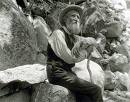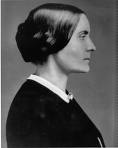
Come Back Home
(By Jonathan Sprout & Dave Kinnoin)
I dream of mountains
I hear them calling me back home.
I hear them calling,
Calling – come back home!
Far from the reach of the city,
Where mountains give way to the sky,
This is where I long to wander,
Watching the seasons go by.
Nothing could feel more exciting
Than being there, ready to roam.
No place could be more inviting.
It's calling me "Come back home!"
Refrain: Let me stand in the heart of a redwood grove
Lightly sprinkled with fresh white snow,
May I just catch a glimpse of a mountaintop
Awash with alpenglow,
Let me live out a dream on Yosemite Stream
Where my wilderness joys abound,
To discover the truth of eternal youth
Upon that sacred ground.
Nature awakens my senses
When I walk among whispering trees
Smelling the sweet-scented cedar
Breathing the crisp glacial breeze.
Hearing a soft creature chorus
Under a star-sparkled dome.
Now who will preserve it all for us
So we can come back home?
Refrain
Bridge: High flowery meadows
Sheer canyon walls
Huge boulder dams
Lacey white waterfalls
Refrain
Outro:
I dream of mountains
I hear them calling me back home.
I hear them calling,
Calling – come back home!
I dream of mountains
I hear them calling me back home.
I hear them calling,
Calling – come back home!
© 2009 Kanukatunes (ASCAP) & Song Wizard Music (ASCAP)
JOHN MUIR
4/21/1838 – 12/24/1914 (age 76)
John Muir (1838-1914), the most influential conservationist and naturalist in America, is known as “the father of our national parks” and “the greatest Californian.” An ingenious inventor who was tragically blinded in an accident, he swore if his sight ever returned, he would devote himself to the inventions of Nature. With his vision miraculously restored, he courageously took a stand against the destruction of America’s great western forests. With his poetic writing he taught us that wild places are precious and fragile spiritual resources that must be preserved. A compassionate dreamer to the core of his soul, he forever changed the way we see our mountains and forests.
In August 2011, I visited many of the lands in California where Muir once lived and walked - Yosemite National Park, Kings Canyon National Park, and his National Historic Homesite in Martinez, California (a 30 minute drive from San Francisco).
In Martinez, I was fortunate to spend some time visiting with Ranger Greg Bacigalupi, who was kind to share some of his vast knowledge about Muir. Mr. Muir had a very understand wife in Louie, who would note that her husband had "low altitude sickness" when he was down in the dumps there at the farm and longing to go back to higher elevations to be more at home among his beloved mountains.
“When we try to pick out anything by itself, we find it hitched to everything else in the universe.” - John Muir
“Everybody needs beauty as well as bread, places to play in and pray in where nature may heal and cheer and give strength to the body and soul.” - John Muir
“Climb the mountains and get their good tidings. Nature's peace will flow into you as sunshine flows into trees. The winds will blow their own freshness into you, and the storms their energy, while cares will drop off like autumn leaves.” - John Muir
“The clearest way to the Universe is through a forest wilderness.” - John Muir
“Thousands of tired, nerve-shaken, over-civilized people are beginning to find out that going to the mountain is going home; that wildness is necessity; that mountain parks and reservations are useful not only as fountains of timber and irrigating rivers, but as fountains of life.” - John Muir
“I care to live only to entice people to look at nature’s loveliness.” - John Muir
* Great mission in life was to see to it that there were more live trees than dead ones to serve mankind… influenced 4 US presidents to think of living trees.
* A voice for the preservation of the Wilderness
* “Father of the National Park System” (only Yellowstone preceded his efforts)
* His daring, courage, nobility of character, selflessness – all essential of heroism … determination, tenacity and sacrifice …
* “Lived thru many decisive pivotal events in the unfolding of modern American society and history – not one of which seems to have attracted his interest or attention.” Was… In the world, but not of it.
* In his love for nature and his efforts to protect it, he was a man ahead of his time.
* 1849, immigrated to US w/ his family age 11
* Had an unquenchable thirst for knowledge… learned by heart all New Testament and ¾ or The Old
* Invented an “early-rising machine” – “At a preset time, it tipped the bed frame to awake the occupant and stand him upon his feet.”
* When he turned his hand to industry and agriculture, he became very successful and made a lot of money.
* Painfully shy, manners uncouth
* Attended Univ. Wisconsin, did not graduate
* Invented “loafer’s chair”… which “fired a startling blank charge from a pistol when the chair’s occupant relaxed enough to lean back in the seat.”
* When asked about patenting his inventions, he said, “All improvements and inventions ought to be the property of the human race. No inventor has the right to profit by an invention for which he deserves no credit. The idea of it was already inspired by The Almighty.”
* 3/6/1867, lost his sight, feared he was becoming a slave to machines of his own devising & determined to invent a better life for himself.
* Eyes heal, 9/1/1867; he begins his first “tramp.”
* “I could have become a millionaire, but I chose to become a tramp.” - John Muir
* Walked to FL, got malaria, went to Cuba… NY… sailed to San Francisco … explored/works in Yosemite Valley
* 4/14/1880, age 42, marries Louie Strentzel, age 33 … was married 25 years, age 42-67
* For nearly 10 years, works hard on farm w/ wife and 2 daughters
* Bright, engaging, mischievous, sparkling, piercing
* Muir had premonitions of both of his parents’ deaths and was able to gather siblings together to go visit each parent barely before he/she died.
* Struck up a special friendship w/ the elder Ralph Waldo Emerson. They met when Emerson came to Yosemite.
* Great story of meeting President Theodore Roosevelt and the 2 going off camping together and truly hitting it off. Muir helped convince TR to make Yosemite a National Park from a CA state park.
* At Glacier Point, look over to Half Dome, TR said “Now this is bully!”
* TR said, while parting, “Good-bye, John. Come and see me in Washington. I’ve had the time of my life.”
* So, he was much better at the spoken word than at the written word. A friend, Harriman, hired a secretary to, in a sense, follow Muir around and record his tales in shorthand… this was transcribed into more than 1,000 pages later.
* “No amount of word making will ever make a single soul to know these mountains.” “One day’s exposure to mountains is better than a cartload of books.” - John Muir
* He knew “the fight to preserve a wild place can be lost only once, but must be won repeatedly.”
* 50 biographies and at least 12 songs about him… in CA, at least 21 public schools are named after him
* 1988, April 21 became “John Muir Day” officially designated by Congress & President Ronald Reagan
* He’s on the 2005 CA commemorative quarter, hiking below Half Dome in Yosemite Valley.
* “In all my wandering days, I have never met anyone as free as myself.” - John Muir
* "Be still… and listen to the songs of the rivers, mountains and trees'
* Be True to Yourself: He “received lots of “helpful” suggestions on what he should do with his life. His family and friends wanted him to choose a profession – the more socially acceptable, the better”, but he chose instead to tinker with inventions and wander through the countryside looking at plants. His younger brother David said, “Forget those confounded weeds, John! Marry and go into business.” But Muir stayed true to himself. In his journal he wrote, “I will follow my instincts, be myself for good or ill, and see what will be the upshot. As long as I live, I’ll hear waterfalls and birds and winds sing. I’ll acquaint myself with the glaciers and wild gardens, and get as near the heart of the world as I can.”
* “He had the courage to live his own ideals, even when others didn’t understand or value them.”
* Muir used to complain that stagecoaches went too fast. He’d say, “You can’t see anything when you’re riding twenty miles-per-hour!”
* He was able to simplify his life so that he could have more time for what he valued most – being outdoors, in nature.
* He walked the streets of San Francisco disheveled, long-haired, always lost in the confines of buildings and traffic, and forever late.
* “I only went out for a walk, and finally concluded to stay out till sundown, for going out, I found, was really going in.” - John Muir
* “In wildness lies the hope of the world” - John Muir
* In Dunbar, thus began an unquenchable appetite for life, despite a Spartan existence
* Much corporal punishment when a boy…lashings from father, from schoolmaster
* Father informed the family the night before that they were moving to America the next day!
* Had a passion for learning as a teenager. Had to go to bed at 9:00, but his father allowed him to get up early and read. JM would get up at 1:00 AM and read for 5 hours before working dawn to dark. His passion would take him into the heart of nature.
* As a young man, he would save money for “studies in the wild”
* He would feel abject terror, sorrow and dread every time he’d leave to go somewhere…
* On his 1,000 mile walk, he’d cover 20 + miles a day.
* Explored Mammoth Cave, KY
* He was on a leafy path to salvation… his journal whimsical… was sometimes dangerously hungry and lived on crackers and water
* At Yosemite became kindred spirits w/ Thoreau (the elder 68)…JM was 33. Thoreau was also shaken by the good-bye.
* He would get “lost” in his joyous process of exploring the Yosemite Valley & mountains (the high country – his sanctuary, his university, his hiding place), looking for evidence of glaciers, writing in his journal, half-starving. He must have perpetually experienced some kind of runner’s high. Meanwhile, he also battled loneliness.
* So he went down to Oakland and was traded off by admirers from household to household, treated like a Brahmin, totally respected, but after “two weary homesick municipal weeks,” he took off again, back to his mountains.
* A non-hunter, but he understood the hunting spirit.
*…Ever spontaneous and deeply eccentric…
* When he camped, he would wake at “bird-time.”
* “Everybody needs beauty as well as bread, places to play in and pray in, where Nature may heal and cheer and give strength to body and soul.” - John Muir
* So, he got married and still wasn’t “at home” there out of the mountains… left for Alaska for a year the day The “fierce storm of steel” devoured much of the great western forests, and JM more and more felt the need to do something about this after his proposal to Louisa was accepted…. He would get sickly when in the valley.
* It wasn’t enough for him just to escape back to the mountains. Now, he needed to take the next step and do what he could to preserve the things he loved.
* JM had never felt so at home among human being as he had in the Aleutian, Eskimo and Athapaskan villagers. They had “unconditional generosity toward their children … and an uninhibited and spontaneous sense of festivity.”
* Who could not see that Yosemite was a song and a cathedral? JM and Robert Underwood Johnson (editor of a prominent of Century Magazine, readership 200,000)
* Muir’s 2 1889 articles: “Treasures of the Yosemite” and “Features of the Proposed Yosemite National Park.” [I should find and read them. They probably have great descriptions in them.]
* “In wilderness is the preservation of the world” - John Muir
* 10/1/1890, the bill that made Yosemite a national park passed.
* 6/4/1892 John Muir becomes 1st president of the Sierra Club, a watchdog organization meant to make sure Yosemite National Park and other parks were not “invaded” by loggers, etc.
* He had become a political warrior fighting for the voiceless mountains, animals and trees.
* Muir did not write (and become famous thus) to become famous. He wrote to tell the nation about the primal beauty and then to attempt to keep this beauty from being destroyed.
* He embodied compassion, generosity, self-discipline and patience
* Over Hetch Hetchy, he was dismissed as romantic, unmanly, unwashed, irrational, impractical and childish.
* He was nature’s most eloquent advocate.
* His sacred duty was to teach people to see.
* He didn’t like the word (or to) hike. He preferred to saunter, to enjoy the process of the walk, to get down on his knees at times and study the tiniest plant. He was often last to arrive at camp at the end of the day. (Albert Palmer, 1911)* “Who publishes the sheet music of the winds of the music of water written in river lines?”
* All Nature’s wildness tells the same story… the earthquakes, geysers, etc… are the orderly beauty-making love beats of Nature’s heart.
* In The Treasures of the Yosemite: great descriptions… the moonlit waterfall experience… the winter rainstorm where the entire valley flooded and he saw dozens of never-before-seen waterfalls…. Great enchanting descriptions.
* Alpenglow = a reddish glow seen near sunset or sunrise on the summits of mountains
* 1976, CA Historical Society voted JM greatest Californian in the state’s history.
* At college, he had less than 50 cents/wk for living expenses and food. He lived on graham crackers until his health gave out. When his father heard of his son’s starvation diet, he relented and sent him $50.
* He condemned the cattlemen, lumbermen and miners as well as the sheep men who used the land for material profit and left it barren.
* To destroy the wilderness is to destroy part of ourselves.
* Muir means Moor, or “a stretch of wild land.” Ironic for a man who would spend his entire life in pursuit of and in love with everything that was wild.
* Became a college dropout at 25 with no idea what he would do with the rest of his life.
* With his new vision, Muir was reborn
* His extraordinary encounters with nature seared his soul
* John Muir had a vision of our earth as a beautiful wild, but a fragile planet and he spent most of his life trying to preserve that beauty. If we do not forget the man, we can hope that his beloved wilderness also will endure.
LINKS:
Sierra Club page about Dave Kinnoin's & my song about John Muir
John Muir Homesite National Historic Site in Martinez, CA



 She was one of the founders of American feminism. For more than half a century, she endured threats and ridicule for her tireless quest to reform the unfair laws that governed women. Crisscrossing the country at a breathtaking pace well into her eighties, she gave speeches and supported rallies for women’s rights. She was arrested in 1872 for daring to vote -- an illegal act for a woman.
She was one of the founders of American feminism. For more than half a century, she endured threats and ridicule for her tireless quest to reform the unfair laws that governed women. Crisscrossing the country at a breathtaking pace well into her eighties, she gave speeches and supported rallies for women’s rights. She was arrested in 1872 for daring to vote -- an illegal act for a woman.